'Kia ora!' - SpongeBob Squarepants speaks Māori
SpongeBob - the world’s most famous sea sponge - is also a fluent te reo Māori speaker. Or at least he will be for five episodes of SpongeBob Squarepants - screening during Māori Language Week (26 July - 1 August 2010).
SpongeBob Squarepants and his sea-dwelling Bikini Bottom friends will speak in te reo Māori next week on the Nickelodeon channel in New Zealand, to help promote the language to a younger audience.
The Māori voice-overs for the five episodes were recorded by an award-winning Kiwi production company that specialises in Māori language children’s programming - Cinco Cine Film Productions.
This is the second year that SpongeBob Squarepants will screen in te reo during Māori Language Week. The Māori-language version had its debut last year, and proved popular with both parents and children.
Big tick from kids
Nickelodeon NZ channel manager Lauren Nola says that SpongeBob was chosen because the show’s universal appeal means te reo Māori would get wider audience exposure.
"The guys at Cinco Cine did an amazing job of translation and delivery of the SpongeBob characters in te reo Māori that’s shown everyone how a crazy little sea sponge can make learning te reo Māori fun for kids of all ages."
TV3 Māori children’s host Tiare Tawera is the voice of the te reo Māori SpongeBob, while Matutaera Ngaporo voices the characters of Patrick and Squidward.
The English version of SpongeBob Squarepants airs in 171 countries, and is translated into 25 different languages. It is the most widely distributed show by MTV Networks.
Te Mahi Kai
The theme for this year’s Māori Language Week is ‘te mahi kai’, or the language of food.
Te Tau Whiri i te reo Māori / the Māori Language Commission says that there will be a strong focus this year on speaking te reo Māori within the community.
"Our key message this year is encouraging use in communities, so we have deliberately chosen an activity-based theme to promote and widen spoken language in communities", says chief executive Glenis Phillip-Barbara.
Te mahi kai means not just partaking in a meal, but also all the activities associated with preparing the meal - such as hunting, diving, fishing, foraging, shopping and food preparation.
Food is an important part of Māori culture in which food gathering and preparation are seen as social occasions.
Te reo Māori awards
The annual Māori Language Week Awards are also open during Māori Language Week.
Businesses, schools, the media, government and community organisations can all enter the awards by showing how they supported te reo Māori during Māori Language Week. The awards are announced on Māori Language Day, on 14 September.
Māori Language Day marks the date in 1972 when a petition calling for courses in Māori language and culture to be offered in New Zealand schools was presented to Parliament.
The landmark petition was the first step towards the formation of the Māori Language Commission, and the subsequent recognition of te reo Māori as one of the two official languages of New Zealand.
From the day grew Māori Language Week in 1975, when celebrations were moved from September to July to better fit the New Zealand school year.
He whakapapa reo Māori / history of te reo Māori
Māori is the ancestral language of the tangata whenua / indigenous Māori people of New Zealand.
The language is considered a national taonga / treasure and guaranteed protection under the Treaty of Waitangi, New Zealand’s founding document.
Te reo Māori was suppressed for many years with the establishment of English-only schools in New Zealand. By the 1970s, it was predicted that Māori would soon be a language without native speakers, causing grave concern.
Steps were taken to preserve Māori language including Te Ataarangi (a language learning system), the establishment of kohanga reo / Māori language pre-schools, kura kaupapa / Māori language schools), and a Māori language television station.
In 1987, te reo Māori was declared an official language of New Zealand. Today, about 25% or 130,000 Māori New Zealanders are able to speak the language.
